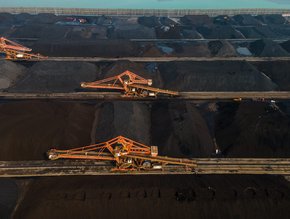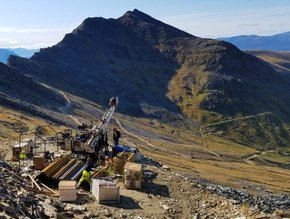US Army Corp denies permit for Alaska’s Pebble Mine project

The US Army Corp of Engineers has issued a final decision denying a key water permit for the contentious Pebble Mine in Alaska, putting the project’s future in doubt - though the company behind the project, Northern Dynasty Minerals, intends to appeal the decision.
The mine, one of the world’s largest copper and gold deposits, has been subject to constantly shifting regulations over the last 13 years. Republican President Donald Trump revived the project early in his term after the Obama administration blocked it.
However, current prominent politicians claiming it would harm the state’s billion-dollar salmon industry prompted an about-face from the outgoing Trump administration. Opponents say the project threatens a world-class sockeye salmon fishery, putting more than $1 billion of revenue and over 10,000 jobs at risk.
In a statement, the Army Corps say the Clean Water Act permit was denied because the plan submitted by the Pebble Limited Partnership detailing how it would handle the project’s waste in the ecologically sensitive area did not comply with Clean Water Act guidelines.
Colonel Damon Delarosa, commander of the U.S. Army Corps of Engineers in Alaska, says in the statement that the agency has concluded that the proposed project was “contrary to the public interest.”
The Pebble Mine Partnership said it is “dismayed” by the decision and that its Canadian parent company, Northern Dynasty Minerals, will lodge an appeal within 60 days.
If built, the mine will produce 70 million tons of gold, molybdenum and copper ore a year and create a pit 1,970 feet (600 meters) deep in Alaska’s Bristol Bay watershed.
Pebble Mine Partnership Chief Executive John Shively says in a statement that the company worked closely with the Corps of Engineers to ensure the project included necessary safeguards and slammed the decision as political. “It is very disconcerting to see political influence in this process at the eleventh hour,” he said.
In August, the US government had given developers 90 days to explain how they would offset damage to wetlands and popular fishing sites amid rising opposition to the project by prominent Republicans.
West Virginia Senator Joe Manchin, the top Democrat on the Senate natural resources committee, praised the decision, saying he was not convinced the company could protect the surrounding fisheries.
“I understand the important role mining plays in our economy, but the Final Environmental Impact Statement for the project did not come near close enough to assuring me this world-class sockeye salmon fishery, which generates $1.5 billion each year and supports 14,000 jobs, would be protected,” he says.
The Natural Resources Defence Council (NRDC) also welcomed the announcement but warned that permit denial was not the last word.
“A permit denial leaves the door open for future mining in Bristol Bay under more politically favourable circumstances,” the group points out in a statement. It adds that President-elect Joe Biden opposes the project.
The United Tribes of Bristol Bay, which represents 15 area tribal governments, and other mine opponents says they would seek permanent protections for the region.
NRDC senior advocate Taryn Kiekow Heimer explains that the US Environmental Protection Agency has authority under a rarely used section of the Clean Water Act to block development.
President-elect Joe Biden said in August he opposes the mine and as president would “protect Bristol Bay.” Transition team spokesman Jamal Brown says his position remains the same.
Northern Dynasty says the Pebble project would provide a secure supply of strategic minerals, in line with the Biden campaign’s goal to boost domestic production of metals used to make electric vehicles, solar panels and other products crucial to his climate plan.
Shares of the Vancouver-based miner fell about 50 percent in trading after news of the permit denial.
- Biden Ruling 'Threat to US Critical Minerals Mining'Supply Chain & Operations
- EU & US form Critical Minerals Security Partnership ForumSustainability
- Laws Thwart US Bid to Match China on Lithium MiningSupply Chain & Operations
- HighGold Mining reports 1mn oz gold at Johnson TractSupply Chain & Operations






